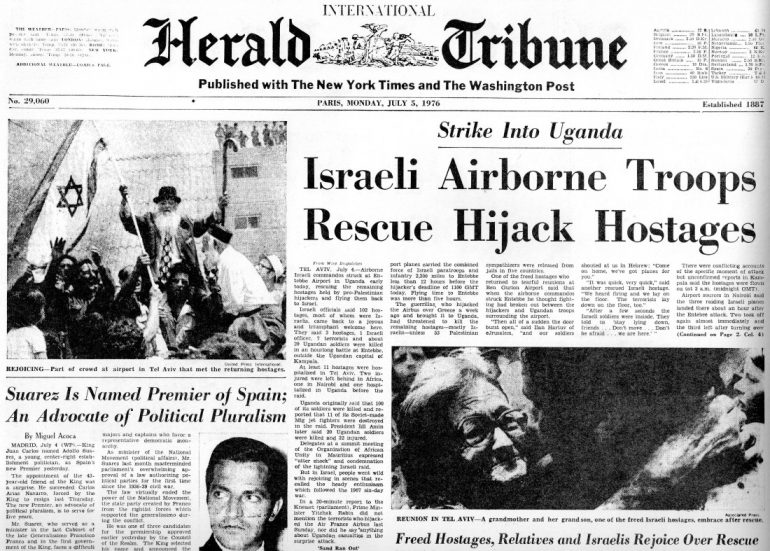There are few IDF missions as well-known as the Operation Entebbe.
On June 27, 1976, terrorists affiliated with the PFLP and a West German group known as the Red Army Faction forced an Air France Airbus to land in Uganda and demanded that Israel release 53 terrorists. The hijackers freed the French crew and non-Jewish passengers, but kept the more than 100 Jewish and Israeli hostages who they threatened to execute.
Israel then launched a dramatic raid, rescuing 98 hostages and killing all eight terrorists. Three hostages were killed in the crossfire. Additionally, Dora Bloch, a 74-year-old British national who had taken ill during the hijacking and was sent to a hospital, was later murdered by the Ugandans as revenge for Israel’s successful rescue operation.
The iconic mission was widely praised as representing a successful blow against international terrorism.
Yet, Telegraph contributor Saul David, noting the 40th anniversary of the mission, in a June 27th article promoting a book he wrote about famous episode, reaches the following conclusion.
Moreover, it could be argued that the success of the raid has actually made it harder for Israeli politicians – particularly Bibi Netanyahu – to embrace the compromises required for a lasting peace with the Palestinians. Why? Because it convinced Israelis that their intelligence services and soldiers could deal with any security threat. “It was double-edged,” one hostage told me. “We were saved but it was bad for Israel. It made peace less likely.”
The reasoning is truly astonishing. Are we to take away from this paragraph that either an unsuccessful raid (where most of the hostages were killed) or giving in to the terrorists’ demands both would have been more preferable outcomes? However, even leaving that aside, let’s briefly examine David’s claim that the success of the raid made Israeli leaders less likely to make compromises for peace.
First, Yitzhak Rabin, who, as prime minister, ordered the Entebbe raid, later (during his next stint as prime minister) signed the Oslo Peace Accords.
Binyamin Netanyahu, whose brother was killed in the raid, signed (in 1998 during his first term as prime minister) the Wye River Memorandum which reinstated implementation of the Oslo II Agreement.
Further, the success of the raid didn’t prevent Israel from withdrawing from Gaza in 2005, or from entering into final status negotiations and offering Palestinians an independent state twice, in 2000 and 2008.
In short, even if we suspend judgement on his bizarre take on the operation, David’s working hypothesis – that thwarting terrorists’ plans to murder Jews was somehow detrimental to peace – simply doesn’t hold up to critical scrutiny.
Related articles
- Just Another Jersey Guy – Matti Friedman On Michael Oren (ruthfullyyours.com)





